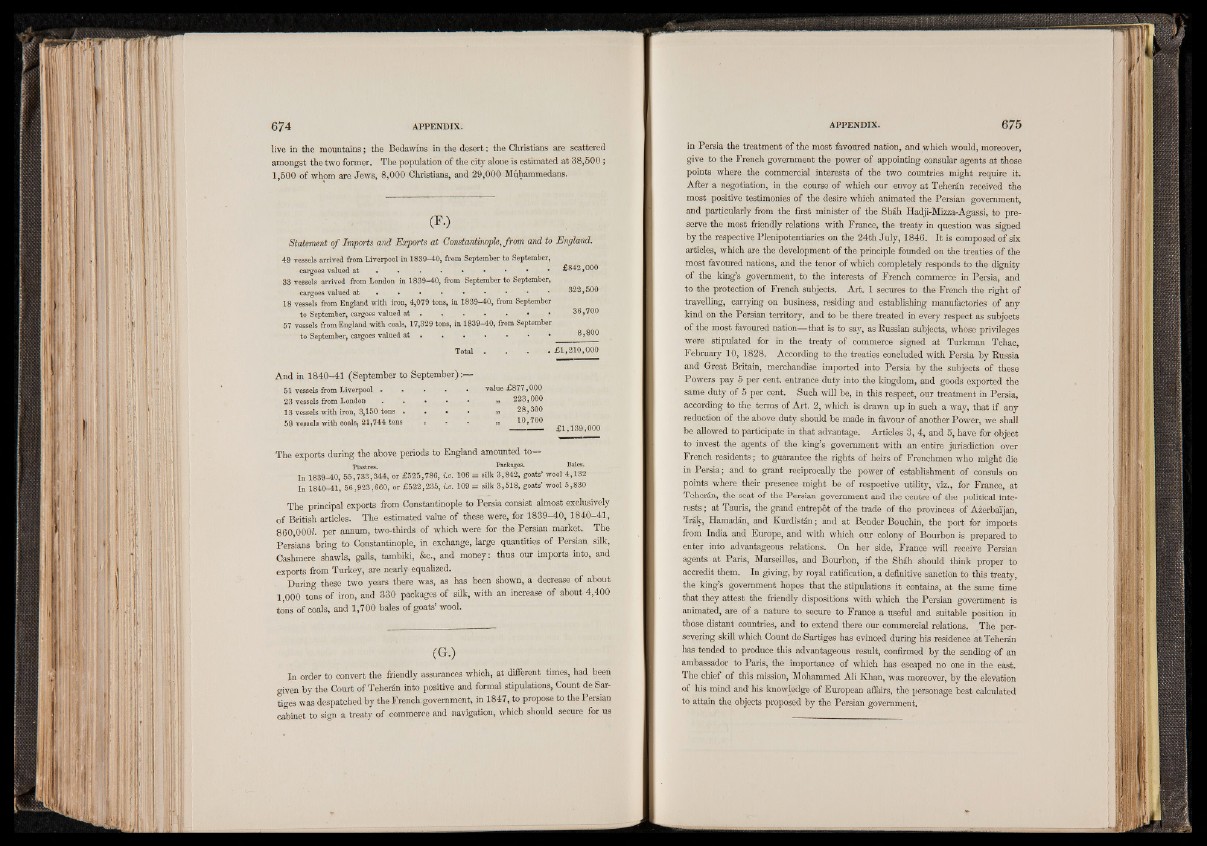
live in the mountains; the Bedawins in the desert: the Christians are scattered
amongst the two former. The population of the city alone is estimated at 38,500;
1,500 of whom are Jews, 8,000 Christians, and 29,000 Muhammedans.
(F.)
Statement o f Imports and Exports at Constantinople, from and to England.
49 vessels arrived from Liverpool in 1839—40, from September to September,
cargoes valued at . £842,000
33 vessels arrived from London in 1839—40, from September to September,
cargoes valued at . > » * * • • * 322,500
18 vessels from England with iron, 4,079 tons, in 1839-40, from September
to September, cargoes valued at ' ■ » • * » 36,700
57 vessels from England with coals, 17,329 tons, in 1839-40, from September
to September, cargoes valued a t .......................................................... * 8,800
Total . . . . £1,210,QQ0
And in 1840-41 (September to September)
51 vessels from Liverpool . . . . . value £877,000
23 vessels from London . * • v 223,000
13 vessels with iron, 3,150 tons . . . . „ 28,300
58 vessels with coals, 21,744 tons . . . ,, 10,700
£1,139,000
The exports during the above periods to England amounted to—
Piastres. Packages. Bales.
In 1839-40, 55,733,344, or £525,786, i.e. 106 = silk 3,842, goats’ wool 4,132
In 1840-41, 56,923,660, or £522,235, i . e . 109 = silk 3,518, goats* wool 5,830
The principal exports from Constantinople to Persia consist almost exclusively
of British articles. The estimated value of these were, for 1839-40, 1840-41,
860 0001. per annum, two-thirds of which were for the Persian market. The
Persians bring to Constantinople, in exchange, large quantities of Persian silk,
Cashmere shawls, galls, tambiki, &c., and money: thus our imports into, and
exports from Turkey, are nearly equalized.
During these two years there was, as has been shown, a decrease of about
1 000 tons of iron, and 330 packages of silk, with an increase of about 4,400
tons of coals, and 1,700 bales of goats’ wool.
(G.)
In order to convert the friendly assurances which, at different times, had been
given by the Court of Teherán into positive and formal stipulations, Count de Sar-
tiges was despatched by the French.government, in 1847, to propose to the Persian
cabinet to sign a treaty of commerce and navigation, which should secure for us
in Persia the treatment of the most favoured nation, and which would, moreover,
give to the French government the power of appointing consular agents at those
points where the commercial interests of the two countries might require it.
After a negotiation, in the course of which our envoy at Teherán received the
most positive testimonies of the desire which animated the Persian government,
and particularly from the first minister of the Sháh Hadji-Mizza-Agassi, to preserve
the most friendly relations with France, the treaty in question was signed
by the respective Plenipotentiaries on the 24th July, 1846. It is composed of six
articles, which are the development of the principle founded on the treaties of the
most favoured nations, and the tenor of which completely responds to the dignity
of the king’s government, to the interests of French commerce in Persia, and
to the protection of French subjects. Art. 1 secures to the French the right of
travelling, carrying on business, residing and establishing manufactories of any
kind on the Persian territory, and to be there treated in every respect as subjects
of the most favoured nation—that is to say, as Russian subjects, whose privileges
were stipulated for in the treaty of commerce signed at Turkman Tchac,
February 10, 1828. According to the treaties concluded with Persia by Russia
and Great Britain, merchandise imported into Persia by the subjects of these
Powers pay 5 per cent, entrance duty into the kingdom, and goods exported the
same duty of 5 per cent. Such will be, in this respect, our treatment in Persia,
according to the terras of Art. 2, which is drawn up in such a way, that if any
reduction of the above duty should be made in favour of another Power, we shall
be allowed to participate in that advantage. Articles 3, 4, and 5, have for object
to invest the agents of the king’s government with an entire jurisdiction over
French residents; to guarantee the rights of heirs of Frenchmen who might die
in Persia; and to grant reciprocally the power of establishment of consuls on
points where their presence might be of respective utility, viz., for France, at
Teherán, the seat of the Persian government and the centre of the political interests
; at Tauris, the grand entrepot of the trade of the provinces of Azerbaijan,
Irak, Hamadan, and Kurdistan; and at Bender Bouchin, the port for imports
from India and Europe, and with which our colony of Bourbon is prepared to
enter into advantageous relations. On her side, France will receive Persian
agents at Paris, Marseilles, and Bourbon, if the Sháh should think proper to
accredit them. In giving, by royal ratification, a definitive sanction to this treaty,
the king’s government hopes that the stipulations it contains, at the same time
that they attest the friendly dispositions with which the Persian government is
animated, are of a nature to secure to France a useful and suitable position in
those distant countries, and to extend there our commercial relations. The persevering
skill which Count deSartiges has evinced during his residence at Teherán
has tended to produce this advantageous result, confirmed by the sending of an
ambassador to Paris, the importance of which has escaped no one in the east.
The chief of this mission, Mohammed Ali Khan, was moreover, by the elevation
of his mind and' his knowledge of European affairs, the personage best calculated
to attain the objects proposed by the Persian government.